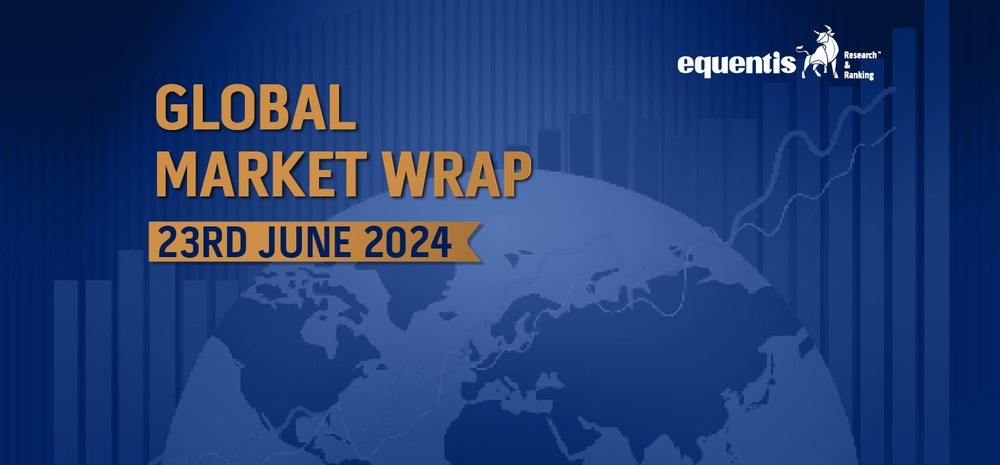The US stock market had a flat week, with mixed economic signs leaving investors uncertain about the next move. On the other hand, the European stock market continued to experience bullish momentum, resulting in all three major European indexes closing the week with steady gains. Other major Asian indices traded on a mixed note.
On the back of robust demand, Brent Crude gained 3% during the week to close at $85 level. And gold was slightly down by 0.61%.
Let’s look at how the major stock market indices did this week
| Index | Previous Day Change (%) | WoW Change (%) |
| US Markets | ||
| Dow Jones | 0.04 | 1.45 |
| S&P 500 | -0.16 | 0.61 |
| Nasdaq | -0.18 | 0.00 |
| European Markets | ||
| FTSE 100 | -0.42 | 1.12 |
| CAC 40 | -0.56 | 1.67 |
| DAX | -0.50 | 0.90 |
| Asian Markets | ||
| Nifty 50 | -0.28 | 0.64 |
| Nikkei 225 | -0.09 | -0.56 |
| Straits Times | 0.18 | 0.26 |
| Hang Seng | -1.70 | 0.48 |
| Taiwan Weighted | -0.66 | 3.33 |
| KOSPI | -0.84 | 0.94 |
| SET Composite | 0.62 | -0.01 |
| Jakarta Composite | 0.88 | 2.16 |
| Shanghai Composite | -0.24 | 1.14 |
US Markets
Shortened trading week, profit booking on high-flying stocks, and mixed economic data all contributed to flat trading in the US stock market this week. Let’s see how the world’s most tracked indexes performed.
Dow Jones
The Dow Jones Industrial Average Index was mostly flat during Friday’s session as traders reacted to retail sales data, which had increased by 0.1% in May after falling 0.2% in April. On a week-on-week basis, the index was up by 1.45%.
S&P 500
The S&P 500 failed to break and stay above the psychologically important 5500 level on Friday’s session as it lacked momentum. In Friday’s session, the index was down slightly by 0.16%, but on a week-on-week basis, it was up by 0.61%.
Nasdaq
Profit booking in some of the high-flying stocks, like Nvidia and Broadcom, resulted in a flat week for the tech-heavy index. In Friday’s session, the index was slightly down by 0.18%.
European Markets
The European stock market rebounded this week as concerns around political uncertainty appeared to reduce, and the outlook for monetary policy easing brightened. Let’s look at how the top three European indexes performed during the week.
FTSE 100
London stocks closed the week on a positive note after domestic inflation fell to 2%, which is well within the Bank of England’s target zone. The FTSE 100 was down by 0.42% on Friday; however, it snapped the five-week losing streak, closing the week with gains of 1.12%.
CAC 40
France’s equity market was mixed at the close in Friday’s session and dropped by 0.56%. However, on a week-on-week basis, the index closed higher at 1.67%.
DAX
It was a mixed session for the German stock market during the week. On Thursday, the country reported the producer prices, which declined by 2.2% year-on-year in May after a fall of 3.3% in April, thus relieving much of the inflation concerns. In Friday’s session, DAX was down by 0.50% and concluded the week with a cumulative gain of 0.90%.
Asian Markets
The Asian market’s major indexes traded mixed during the week, influenced primarily by domestic issues. However, the market keeps a tight eye on global developments, particularly central bank comments regarding rate cuts. Let’s look at how the various Asian indices performed over the week.
Nifty 50
The Indian market continues to trade with optimistic biases; however, the past week has seen increased volatility. On Friday, the Nifty 50 was down by 0.28%, and on a week-on-week basis, it was up by 0.64%.
Nikkei 225
The Japanese stock market traded with a negative bias during the week, as data showed inflation had accelerated in May, and the Yen had also weakened against the US Dollar. On Friday, the Nikkei 225 was slightly down by 0.09%, concluding the week with a cumulative loss of 0.56%.
Straits Times
The Strait Times, Singapore’s leading stock market index, traded on a weak note throughout the week. It was up by 0.15% on Friday and ended the week with a slight gain of 0.26%.
Hang Seng
Led by losses in real estate and tech stocks, Hang Seng declined by 1.70% on Friday. However, on a week-on-week basis, the index gained 0.48%.
Taiwan Weighted
Taiwan Weighted Index traded with a positive bias during the week. Despite the negative close of 0.66% on Friday, the index was up by 3.33% on a weekly basis.
KOSPI
During the week, the KOSPI index touched a multi-year high and is at its highest level since January 2022. In Friday’s session, the index closed 0.84% lower, but on a week-on-week basis, it was up by 0.94%.
SET Composite
Thailand shares gained on Friday, with the SET Composite up by 0.62%. However, on a week-on-week basis, the index closed completely flat with a minor loss of 0.01%.
Jakarta Composite
The Indonesian stock market rebounded this week after Morgan Stanley downgraded it earlier. In Friday’s session, the Jakarta Composite rose 0.88%, bringing the week’s total gains to 2.16%.
Shanghai Composite
The continued decline in China housing prices and mixed economic data dampened investor sentiment. In Friday’s session, the Shanghai Composite was down by 0.24% and concluded the week with a cumulative loss of 1.14%.
Wrapping Up
Global markets remain cautiously optimistic as investors continue to weigh mixed economic signals. In the US, concerns about slowing growth and persistent inflation kept markets flat, while Europe saw a bullish trend driven by easing political uncertainty and positive economic outlooks. Asian markets experienced mixed performances, heavily influenced by domestic factors and global developments. Overall, staying informed is key for investors navigating the evolving global market landscape.
*Disclaimer Note: The securities quoted, if any, are for illustration only and are not recommendatory. This article is for education purposes only and shall not be considered as recommendation or investment advice by Research & Ranking. We will not be liable for any losses that may occur. Investments in securities market are subject to market risks. Read all the related documents carefully before investing. Registration granted by SEBI, membership of BASL, and certification from NISM in no way guarantee the performance of the intermediary or provide any assurance of returns to investors.
How useful was this post?
Click on a star to rate it!
Average rating 0 / 5. Vote count: 0
No votes so far! Be the first to rate this post.
I’m Archana R. Chettiar, an experienced content creator with
an affinity for writing on personal finance and other financial content. I
love to write on equity investing, retirement, managing money, and more.
























